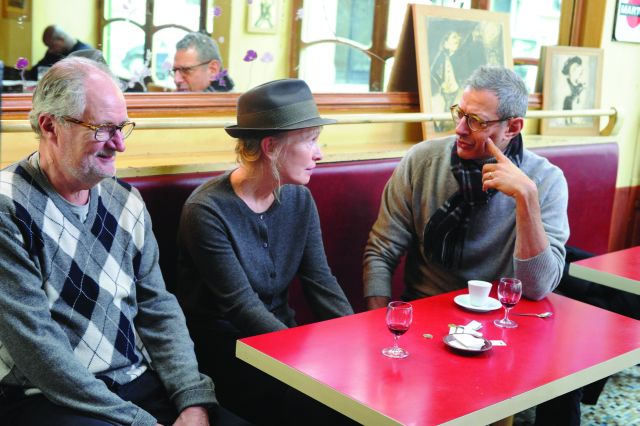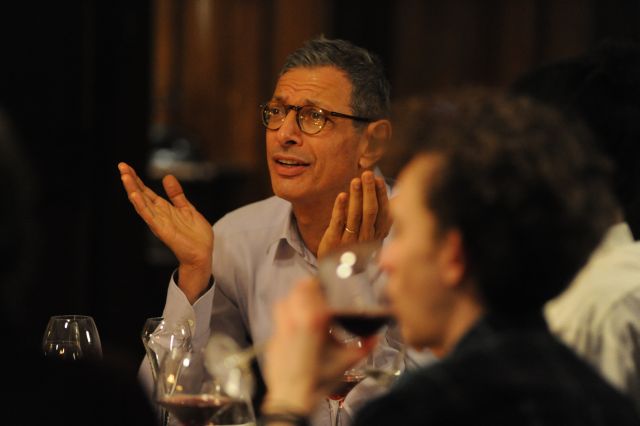One of the joys of autumn is the seasonal return to films about - and intended for - grown-ups, and movies don't come much more crisply and buoyantly adult than Le Week-End, at once the latest and best from the director/writer team of Roger Michell and Hanif Kureishi. The abundant wisdom of the pair's third screen collaboration within 10 years surely reflects the growing awareness that comes with age of the derailments, large and small, that lie scattered along life's way.
But whereas one might expect a gathering dourness from this excavation of marital fissures as they are laid bare during a Birmingham couple's anniversary weekend in France, the film benefits from a glancing whimsy that is itself definably Gallic: it's as if the very presence of Paris has put a spring in everyone's step (a condition to which Woody Allen of late would clearly relate), leaving its blissful trio of stars to do the rest. And, zut alors, do they ever.
 Jim Broadbent and Lindsay Duncan (pictured right with the film's third lead, Jeff Goldblum) are expertly matched as a couple who have barely settled into their Eurostar seats before the cracks in their conjugal union are beginning to show. Nick (Broadbent) is financially fretful, sexually unfulfilled, and browbeaten. He is also deeply smitten with Meg (Duncan), his coolly analytical spouse who jokes about being "tri-polar" and accuses her husband of 30 years of chewing his food like an "old horse at a trough". Will these few days away mark time for the pair at whatever cost to a family back home who are intermittently referenced via phone calls and the like?
Jim Broadbent and Lindsay Duncan (pictured right with the film's third lead, Jeff Goldblum) are expertly matched as a couple who have barely settled into their Eurostar seats before the cracks in their conjugal union are beginning to show. Nick (Broadbent) is financially fretful, sexually unfulfilled, and browbeaten. He is also deeply smitten with Meg (Duncan), his coolly analytical spouse who jokes about being "tri-polar" and accuses her husband of 30 years of chewing his food like an "old horse at a trough". Will these few days away mark time for the pair at whatever cost to a family back home who are intermittently referenced via phone calls and the like?
Maybe but just as possibly not, given the intermingling of opposites that for some while, one senses, has kept this marriage on track. "You can't not love and hate the same person," Nick decides, some time before he twice praises Meg as "hot" only to add the words "but cold" immediately after. The film is startlingly alert to the Janus-faced qualities of desire and desperation, and its neatly structured narrative gets a fillip from the introduction of a spry, wry Jeff Goldblum in prime form as Morgan, an old Cambridge pal of Nick's who has effected his own escape to Paris with a much younger, and pregnant, wife.
 Is Morgan living any man's midlife dream? Once again, the film is too smart to answer decisively beyond building to a dinner party (with Goldblum, pictured left) that culminates in a monologue from Nick that looks set to become an acting class staple - though good luck to anyone attempting to better the haunted sense of self that Broadbent brings to every second of a superlative performance. His grasping cry of "don't do that" ranks in power with the "please don't" that accompanies the climax of Tom Stoppard's The Real Thing, as befits a film steeped in a full-blooded awareness of the theatre that is in no way stagey (the central pair are seen visiting Beckett's grave, while Broadbent's work puts one in mind on occasion of a celluloid Vanya.)
Is Morgan living any man's midlife dream? Once again, the film is too smart to answer decisively beyond building to a dinner party (with Goldblum, pictured left) that culminates in a monologue from Nick that looks set to become an acting class staple - though good luck to anyone attempting to better the haunted sense of self that Broadbent brings to every second of a superlative performance. His grasping cry of "don't do that" ranks in power with the "please don't" that accompanies the climax of Tom Stoppard's The Real Thing, as befits a film steeped in a full-blooded awareness of the theatre that is in no way stagey (the central pair are seen visiting Beckett's grave, while Broadbent's work puts one in mind on occasion of a celluloid Vanya.)
Duncan is every bit as remarkable as the comparatively self-contained Meg, a tougher role in that this spoken embodiment of "melting ice" threatens to lob sympathy firmly in Nick's court: to that extent, one can tell that this is a movie made by men. On the other hand, it's difficult not to share Meg's exasperation at Nick's multiple deceptions, and Duncan's silken severity seems just the right complement to Broadbent's open-faced bewilderment mixed with alarm. Some might assume there to be no exit for this couple, to cite a Frenchman who goes unacknowledged here. But as an hommage-laden final scene suggests, lacerations can perhaps give way to levity as well. Here's betting that Nick and Meg trade in their return train ticket for many an aperitif at the Café de Flore.
Overleaf: Watch the trailer for Le Week-End

 Jim Broadbent and Lindsay Duncan (pictured right with the film's third lead, Jeff Goldblum) are expertly matched as a couple who have barely settled into their Eurostar seats before the cracks in their conjugal union are beginning to show. Nick (Broadbent) is financially fretful, sexually unfulfilled, and browbeaten. He is also deeply smitten with Meg (Duncan), his coolly analytical spouse who jokes about being "tri-polar" and accuses her husband of 30 years of chewing his food like an "old horse at a trough". Will these few days away mark time for the pair at whatever cost to a family back home who are intermittently referenced via phone calls and the like?
Jim Broadbent and Lindsay Duncan (pictured right with the film's third lead, Jeff Goldblum) are expertly matched as a couple who have barely settled into their Eurostar seats before the cracks in their conjugal union are beginning to show. Nick (Broadbent) is financially fretful, sexually unfulfilled, and browbeaten. He is also deeply smitten with Meg (Duncan), his coolly analytical spouse who jokes about being "tri-polar" and accuses her husband of 30 years of chewing his food like an "old horse at a trough". Will these few days away mark time for the pair at whatever cost to a family back home who are intermittently referenced via phone calls and the like?  Is Morgan living any man's midlife dream? Once again, the film is too smart to answer decisively beyond building to a dinner party (with Goldblum, pictured left) that culminates in a monologue from Nick that looks set to become an acting class staple - though good luck to anyone attempting to better the haunted sense of self that Broadbent brings to every second of a superlative performance. His grasping cry of "don't do that" ranks in power with the "please don't" that accompanies the climax of Tom Stoppard's The Real Thing, as befits a film steeped in a full-blooded awareness of the theatre that is in no way stagey (the central pair are seen visiting Beckett's grave, while Broadbent's work puts one in mind on occasion of a celluloid Vanya.)
Is Morgan living any man's midlife dream? Once again, the film is too smart to answer decisively beyond building to a dinner party (with Goldblum, pictured left) that culminates in a monologue from Nick that looks set to become an acting class staple - though good luck to anyone attempting to better the haunted sense of self that Broadbent brings to every second of a superlative performance. His grasping cry of "don't do that" ranks in power with the "please don't" that accompanies the climax of Tom Stoppard's The Real Thing, as befits a film steeped in a full-blooded awareness of the theatre that is in no way stagey (the central pair are seen visiting Beckett's grave, while Broadbent's work puts one in mind on occasion of a celluloid Vanya.)